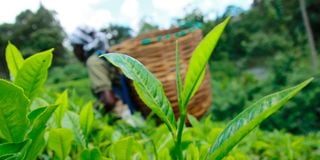40pc of tea stocks unsold on price, quality concerns

A worker picks tea leaves at a farm in Nyeri County on May 25, 2023.
What you need to know:
- The drop in tea prices against the higher reserve price has seen calls for the removal of the floor price.
- Average auction price for tea sold in 2023 was down at $2.24 (Sh321.61) from $2.49 (Sh357.51) in 2022.
An estimated 236.9 million kilogrammes of tea or 40 per cent of stocks delivered for sale at the Mombasa auction went unsold in 2023 as buyers kept away over high reserve prices and poor product quality.
According to new disclosures by the Tea Board of Kenya (TBK), the absorption rate for tea on offer at the Mombasa auction was lower at an average of 60 per cent compared to 76 per cent in 2022 and 84 per cent in 2021.
Farmers from factories in the West of the Rift were the worst hit having had the highest volumes of unsold teas in the year while volumes of Broken Pokoe 1(BP1) grade teas across all factories suffered low sales as their penetration of key markets including Russia and Iran declined.
At the same time, the average auction price for tea sold in 2023 was down at $2.24 (Sh321.61 at current exchange rates) from $2.49 (Sh357.51) in 2022 which upset the reserve price of $2.43 (Sh348.89) set for teas sold by the Kenya Tea Development Agency (KTDA)- the auction’s largest participant.
Reduced price
“The lower absorption and reduced prices were attributable to increased volume of lower quality teas offered by the tea factories at the auction,” TBK said in a statement on Thursday.
TBK states that for each specific grade of tea, the price and absorption follow the demand and quality with the quality being described as leaf appearance, leaf infusion, and liquoring characteristics.
Smallholder tea factories which delivered quality ranging from good medium to best were however spared from the fallout of the low absorption rate as the teas fetched higher prices averaging of Sh391.97 ($2.73) per kilogramme for the main grades.
The drop in tea prices against the higher reserve price has seen calls for the removal of the floor price as sellers decry large stocks of unsold consignments of the green leaf.
Reserve price
Last month, Principal Secretary in the State Department for Investments Promotion Abubakar Hassan Abubakar said the government would hold talks with tea sector players to start repealing the regulations that introduced the reserve price.
The reserve price was introduced in July 2021 in a bid to lift earnings for smallholder tea farmers.
The government has, however, admitted to unintended consequences in the move which has seen it advocate for a return to price liberalisation.
“In terms of the stock that is yet to be sold, it is because of the pricing control that was introduced to solve a problem, but it looks like it brought unintended consequences. We are now going to have a conversation on how we will liberalize that,” Mr Abubakar said.





